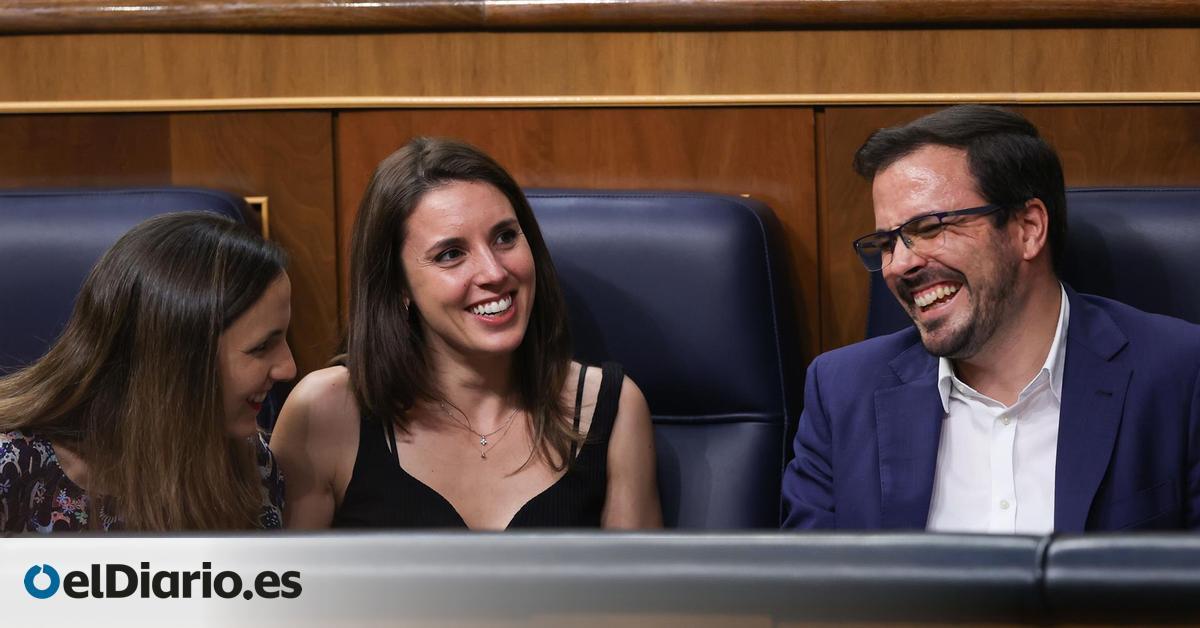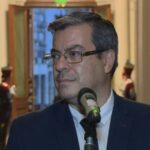
Less than 100 days before 28M, the map on the left for municipal and regional governments is becoming clearer. Podemos and Izquierda Unida have already reached agreements to come together in almost all the communities where there were options. Without hope in Aragon or Asturias, and in the absence of knowing what will happen in Castilla-La Mancha or in the Valencian Community, the two main formations of the left have opted to set aside their differences for the first major examination at the polls of the coalition government . In the background, the conversations between Yolanda Díaz’s Sumar and the parties that she wants to group to compete in the general elections.
Yolanda Díaz activates talks with Podemos for the launch of Sumar
Further
February has been a prolific month in terms of agreements. Izquierda Unida had set the end of January as the horizon to define its electoral alliances for May 28, but it has been postponing that limit with the aim of reaching a greater number of agreements in the territories where there were more difficulties of understanding with Can. In recent weeks both formations have sealed confluences in the Canary Islands, the Balearic Islands and Extremadura, as well as global pacts for city councils in communities where there will be no autonomous communities, such as Euskadi, where the two forces have reached a joint agreement with Alianza Verde, the environmentalist party of Juantxo Lopez de Uralde.
“We note that there is still progress in contacts in some of the missing territories. Given the complexity of some of the ongoing conversations and the multiple actors involved, we have given ourselves one more month to finalize them”, explains Ismael González, federal head of Organization of UI.
In May they will renew government a total of 12 communities (Andalusia, Euskadi, Catalonia, Castilla y León and Galicia have already held them at some point) and in eight of them the two main forces of the state left have already closed confluence agreements, in many for the first time since Podemos broke into the political scene, as in the Region of Murcia o Cantabria. To them is added La Rioja, where an agreement was reached a few months ago that is waiting for Podemos to ratify it.
In any case, according to coalition sources, with the pacts already reached the confluences that were reached in 2019 will be overcome and municipal alliances will also multiply. The places in which they have already been closed are: Community of Madrid, Region of Murcia, Navarra, Cantabria, the Balearic Islands, Extremadura, the Canary Islands, as well as La Rioja. There is also a global agreement for municipalities in Catalonia with the common ones, under the En Comú Podem formula and in Euskadi under the Elkarrekin brand.
The scenario of reconciliation of these two formations also occurs in a context of tense calm at the national level around the Sumar negotiations, the platform of the second vice president, Yolanda Díaz, to bring together the entire left under the same umbrella. Izquierda Unida has publicly aligned itself with the leader of the space while agreeing in the communities and municipalities with Podemos, which is waiting for the platform to finish materializing to start formal negotiations for the general elections. In recent days, Díaz has revealed that she has started talks with Podemos and the rest of the parties to start drawing what the scenario will be like for the generals.
In the environment of Podemos they believe that the next elections are a priority and they want to arrive “as strong as possible” in a context that is not very propitious, the first in the entire country without Pablo Iglesias as leader. In addition to measuring the electoral strength that the organization has after three years of coalition government, Podemos is at stake in these elections to maintain its territorial power. That is, his presence in the six regional executives in which he currently sits.
To achieve good results, they say, they have tried to work “to achieve alliances and widen the space.” They ask for “discretion” in the negotiations that are still taking place, especially in the Valencian Community and in Castilla-La Mancha, as well as in Castilla y León and Andalusia, to reach an agreement in the majority of municipalities. But in the formation led by Ione Belarra they are “satisfied with the agreements reached” and believe that the agreements reached are “fair”.
In Podemos they convey that their strategy so far has been to provide certainty to the public for the next elections. On the one hand, with the political task done, with primaries in all the territories and conferences such as the inter-parliamentary one that was held this weekend in Seville. And, on the other, trying to advance in these alliances. “We read that while waiting for the companions of the political space to resolve and clarify the steps to take with Yolanda [Díaz] and Sumar, we had to give certainties and have the task done as a political organization ”, they maintain.
In some of the territories, the agreements are extended to other political forces. Although the negotiations are carried out at the regional and local level, since Izquierda Unida maintains its federalized organization, some time ago they agreed on a formula that they have repeated in different territories: reaching framework agreements between these two organizations and leaving space in each of the ready to incorporate other nearby formations.
Thus, in the Region of Murcia, Podemos can include leaders of Alianza Verde and IU in some positions on its lists, add members of Equo or Más País. They will also do so in Extremadura, for example, while in Euskadi the unitary candidacy for the main institutions will include those of López de Uralde, all under the Elkarrekin brand, to which other forces could be added. Although there are no regional elections in the Basque Country, regional elections are held.
In the Valencian Community things progress more slowly, but once Compromís abandoned the idea of integrating a joint list of the left, the union between Podem and Esquerra Unida seems easier. Those of Héctor Illueca have already signed an agreement with Alianza Verde that they announced this week.
From Izquierda Unida they celebrate the acts already achieved, which, they consider, have exceeded expectations. “We are very satisfied with the result of the agreements already closed and with the expectations of those that are still underway with other forces from our same political space in the face of the important municipal and regional elections to be held next 28M,” says the federal head of UI organization. The coalition spokesperson, Sira Rego, assessed the agreements reached at a press conference on Monday. “We are working on all the unitary processes and we are going to exhaust the deadlines in all the territories,” she promised.
Conversations with Add
In parallel to these negotiations forged at the local and regional level, in recent weeks Yolanda Díaz has begun conversations with the different actors in the space that she aspires to bring together for the future. Last Friday, the vice president advanced that there had been contacts between Sumar and other political forces such as Podemos. Although he did not go into many details, sources familiar with the meetings report that the contacts began to take place a few weeks ago with the aim of paving the way for future negotiations to shape the future coalition.
In Podemos they celebrate that Díaz has begun to move in this line, although they would prefer that he print more speed to the process. “Time is pressing, but we respect his time,” said the formation’s spokesman, Pablo Fernández, on Monday. The Organization Secretary, Lilith Verstrynge, said this weekend that the vice president’s team informed them in these talks that she does not plan to start negotiations until the summer.
What the party leaders do ask of the vice president is that she get involved in the 28M campaign and participate in the events of Podemos and Unidas Podemos. “What we are focused on is preparing the regional elections that are fundamental in the future of Podemos. We would like Yolanda to campaign, because these elections are crucial in a State like the Spanish one and part of the result of the general elections will be conditioned by that of the municipal ones”, said Fernández.
The meetings have aroused “great enthusiasm” in the United Left environment. At the press conference this Monday, Rego showed his organization’s “maximum understanding” of the deadlines set by the vice president and celebrated that the steps he is taking so far are “a very good sign.” Rego celebrated Sumar as an “opportunity” for the unity of the transforming left and proof of this is that the formations are being able to sit down to “talk and dialogue” to have that political subject present to the electoral cycle in conditions.
The unknown More Country
A good part of the efforts that Yolanda Díaz is making in her talks to form Sumar are aimed at convincing the political forces that at some point were part of Podemos or eventually joined the party. This task of reconciliation, at least formal, is intended for the generals, although in some 28M squares there are possibilities of total unity.
One of the places where there were options for a complete confluence of the left was Andalusia. Although the alliances there are advancing at an uneven pace, months ago the progressive space managed to agree on a joint candidacy in Córdoba with Podemos, IU and Más País Andalucía. However, given the rapprochement of the two parties of Unidas Podemos in the different municipalities of that community, Más País decided this month to delete all the candidacies already agreed upon, such as that of the Cordoba capital, or to withdraw from the negotiations that were advancing in places like Seville. .
In that community, the left has been facing significant difficulties for the agreement since the fateful confluence of Por Andalucía for the autonomous communities, from which Podemos was left out at the last moment by not registering the coalition negotiated in extremis on time.
In general, Más País or its regional brands will be separated from Podemos, as in Madrid, where there will be two ballots to the left of the PSOE both in the community and in the city: the one for Más Madrid and the one that includes Podemos and IU, after reject the formation of Mónica García to a unitary candidacy. In Castilla-La Mancha, where a global agreement has not yet been reached, there is progress between IU and Más País for a confluence, which has already materialized for capitals such as Ciudad Real, while in Cuenca, Albacete or Talavera, there is a meeting between Podemos, IU and Equo.
More convulsed is the situation in the Canary Islands, where the numerous leftist forces tried for months to set up a table for a joint candidacy that never went beyond being a chimerical idea. Two different candidacies are emerging in the archipelago: that of the Proyecto Drago of the former secretary of Organization of Podemos Alberto Rodríguez, in alliance with Equo and the pro-independence party Ahora Canarias; and the one that will make up Podemos, Izquierda Unida and the local Sí Se Puede.
Source: www.eldiario.es

